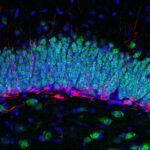Lien vers Pubmed [PMID] – 35114101
Lien DOI – 10.1016/j.neuron.2022.01.011
Neuron. 2022 April; 110(8):1400-1415.e6
Chronic stress is a major risk factor for depression onset. However, it remains unclear how repeated stress sculpts neural circuits and finally elicits depression. Given the essential role of lateral habenula (LHb) in depression, here, we attempt to clarify how LHb-centric neural circuitry integrates stress-related information. We identify lateral hypothalamus (LH) as the most physiologically relevant input to LHb under stress. LH neurons fire with a unique pattern that efficiently drives postsynaptic potential summation and a closely followed LHb bursting (EPSP-burst pairing) in response to various stressors. We found that LH-LHb synaptic potentiation is determinant in stress-induced depression. Mimicking this repeated EPSP-burst pairings at LH-LHb synapses by photostimulation, we artificially induced an “emotional status” merely by potentiating this pathway in mice. Collectively, these results delineate the spatiotemporal dynamics of chronic stress processing from forebrain onto LHb in a pathway-, cell-type-, and pattern-specific manner, shedding light on early interventions before depression onset.

